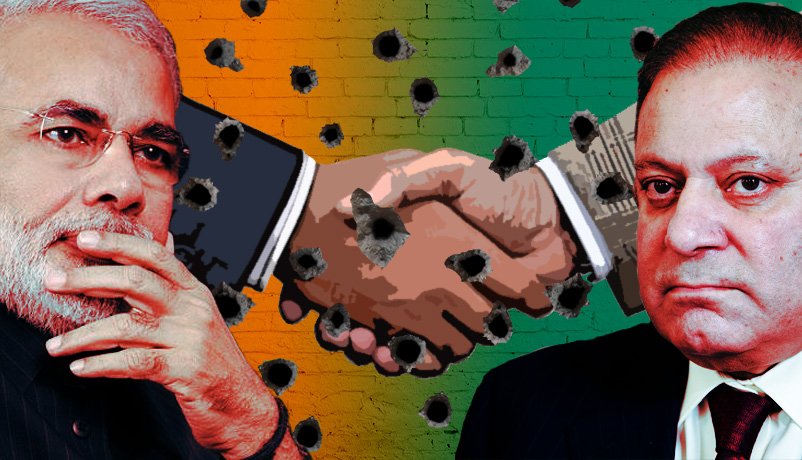
MAY 26, 2014: Narendra Modi first signaled a new approach to Pakistan when he invited his Pak counterpart Nawaz Sharif – and other SAARC leaders – to the swearing in of the new government in May 2014, an unprecedented move for any Indian Prime Minister.
JULY 2014: Barely two months after this move, Pakistan responded with at least 19 ceasefire violations in the Jammu and Kashmir sector.
NOVEMBER 27, 2014: The two Asian-leaders met in Kathmandu at the South Asian Association for Regional Cooperation (SAARC) summit and shook hands, but did not hold any bilateral talks.
NOVEMBER 28, 2014: Ahead of Modi’s election rally in Udhampur and Poonch, militants infiltrated into Arnia district of Jammu and disrupted his rally. The aftermath of the scuffle resulted in the killing of 4 fidayeens by Indian security forces. The encounter also claimed the lives of 3 soldiers and 3 civilians.
DECEMBER 5, 2014: Three-days ahead of Modi’s visit to Srinagar and Anantnag, 11 jawans were killed in series of grenade attacks by terrorists.
JULY 10, 2015: On the sidelines of the SCO Summit in Ufa, the leaders reinstated their commitment to restart the dialogue process, which took had ground to a halt after the Mumbai attacks OF 26 November, 2008.
JULY 17, 2015: A few days before a scheduled meeting in New Delhi between India’s National Security Adviser Ajit Doval and his Pakistani countepart Sartaj Aziz, Three Pakistani terrorists attacked a bus and police station in Gurdaspur, Punjab killing seven Indian nationals. This led to the calling off of the talks.
AUGUST 5, 2015: Two Lashkar-e-Taiba armed terrorists attacked a Border Security Force (BSF) convoy in Udhampur, Jammu and Kashmir. One terrorist from Pakistan, identified as Mohammad Naved was caught alive while the other was killed.
AUGUST 22, 2015: Sartaj Aziz, member of Pakistan’s National Security Agency, cancelled his visit to New Delhi, blaming India’s refusal to allow a meeting with Kashmiri separatist parties.
AUGUST 25, 2015: Around 900 border ceasefire violations on India-Pakistan Border with 19 jawans and 34 civilians having lost their lives ever since Modi came to power.
Consequently, India called off secretary level talks to be held in Islamabad after Pakistan High Commissioner Abdul Basit met with Hurriyat separatist leaders from Kashmir.
SEPTEMBER 19, 2015: Pakistan marines opened fire on two Indian boats off the Gujarat coast with five Indian fishermen onboard. One Indian fisherman, Iqbal Abdul Bhatti was killed.
NOVEMBER 24, 2015: The Pakistan Maritime Security Agency apprehended 18 Indian fishermen along with 3 of their boats in Arabian sea near Jakhau port in Kutch district.
NOVEMBER 30, 2015: In the wake of Climate Change Conference in Paris, the two leaders reiterated their commitment to the dialogue process.
DECEMBER 2015: in the first week of December, Indian and Pakistani delegations led by Doval and Aziz, respectively, finally met in Bangkok.
The Ministry of External Affairs of India said the discussions covered peace and security, terrorism, Jammu and Kashmir, and other issues, including tranquillity along the Line of Control.
DECEMBER 8, 2015: External Affairs Minister Sushma Swaraj met Sharif and Aziz ahead of the annual Heart of Asia conference in Islamabad. Easing the deadlock, talks were focused on resumption of the composite dialogue process.
DECEMBER 25, 2015: On his way back from Kabul, PM Modi rattled he status quo by making an unscheduled stop in Lahore to attend Nawaz Sharif’s granddaughter, Mehrun Nisa’s wedding at Sharif’s Raiwind palatial residence.
The main components of the surprise-meet centred on modalities of bilateral comprehensive dialogue; the two leaders announced that foreign secretaries would meet on January 15, 2016 to chart the course for resumption of dialogue.
JANURAY 2, 2016: Barely a week later, the Indian Air Force base in Pathankot, Punjab — 50 kilometres from the militarised border between the two countries — was attacked at 3 am by 4 suspected Pakistani terrorists, killing 6 Indian defense personnel.
MARCH 29, 2016: A India-Pakistan Joint Investigation Team (JIT) visits Pathankot to investigate the alleged terror-attack on the airbase.
APRIL 4, 2016: Days after it returned, Pakistani media reports say JIT report found that India has staged the encounter to defame Pakistan.
APRIL 7, 2016: Pakistan High Commissioner announces suspension of India-Pakistan peace dialogue process.
APRIL 26, 2016: Indian and Pakistani foreign secretaries S Jaishankar and Aizaz Ahmad Chaudhry respectively discussed all outstanding issues, with India seeking to keep the focus on terrorism and Pakistan underlining Kashmir as the core issue.





Be the first to comment